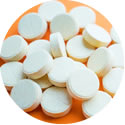Stu: There’s no time like the present to focus on supporting our immune system but how do we know where to start with so many mixed messages floating around? Is there really a magic pill or potion that will give us that much needed boost or is it as simple as eating a healthy diet and and exercising regularly? In this article we examine 3 of the most common assumptions and look at the science supporting them…
1. Taking Vitamin C Helps Prevent Colds & Flu

Foods rich in vitamin C include broccoli, cauliflower, kale, kiwis, oranges, capsicums, sweet potatoes, strawberries, and tomatoes. If you’re not one to eat a lot of fruit or veggies you could always blend them together in a smoothie as it’s an easy way to consume LOTS of nutrients very quickly while being gentle on the digestive system (see point 3 below).
2. Exercise Makes No Difference To Your Immune System

Note: It is important not to go overboard though… a recent study found high-performance athletes have an increased risk of infection. Endurance athletes (like marathon runners, triathletes and ultra-endurance enthusiasts) have notably depressed immunity, especially when it comes to upper respiratory tract infections (like colds). You may not class yourself as an athlete but smashing goals at the gym everyday can have a similar effect and could depress your immune system. It’s important to give the body time to recover after exercise.
3. The Immune System Functions Independently

Learn more about improving your gut health below:
- Michael Ruscio – Healthy Gut Healthy You
- 2 Things That Radically Improved My Gut Health
- 6 Ways to Improve Your Gut Health
The Bottom Line
You can make a host of lifestyle and dietary changes TODAY to support your immune system. Practices including reducing your sugar intake, staying hydrated, exercising regularly, getting adequate quality sleep, and managing your stress levels all help. You can learn more about these strategies in our article below:







